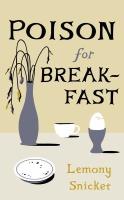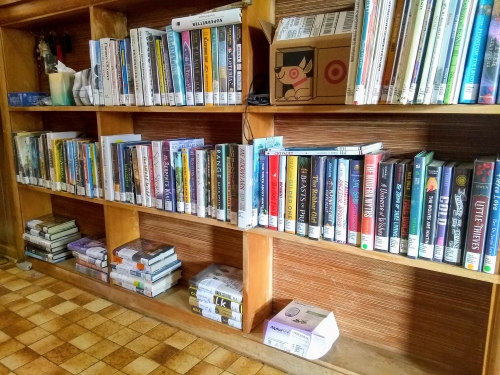
A perfect little gem of a book.
A book I quickly fell in love with. It may not be a perfect book for every reader, as we all have our different preferences. Not everyone will love it as much as I. But I love it. I find it hard to imagine a book that could be more perfect.
I rarely buy books. I work in a library, so I feel almost every day I have all the books I could ever want at my fingertips for free. I don't often feel the need to buy them for myself. Plus, buying a book means I am unlikely to read it.
These are (most of) the books I currently have checked out from my library, hoping to read soon.

That is typical. I always have too many books checked out that I am hoping to soon read. Which means I almost always have something overdue, which means I must read those next, before anything else. Books I buy never become overdue, so they never become the books I must read next, so I never get to read them.
So I rarely buy books.
Every so often I'll love a book so much that I'll decide to buy it anyway, which means I'll put it on a wish list and eventually, when the moment is right for a treat, get one.
I've already, before writing this review, the morning after I finished listening to the excellent audiobook read in a perfect, droll voice by Patrick Warburton, ordered myself a copy of this book.
Poison for Breakfast tells a mystery. And it is a book of philosophy. It is a book that grapples with the philosophical quandary of life's existentially mysteriousness. And it demonstrates with every page, sentence, and word, how literature helps us endure the bewildering mystery that is life. And it does it in the wry, humorous voice of Lemony Snicket.
Mr. Snicket declares right up front that this is a book of philosophy, admitting that might turn off some readers, soon after sharing he has inadvertently eaten poison for breakfast. This book tells the story of his day spent trying to solve the mystery of how he ate poison for breakfast and what to do about it.
The book tells that mystery story, yet most of the book is digressions into Mr. Snicket's thoughts, his constant philosophical ponderings and ruminations. Often it feels like the writing of old Russian and German philosophers. Yet he achieves this style while remaining entirely accessible to all readers, including the young. He is never stuffy or boring or any of the labels typically attributed to this kind of writing. Our library has put it in the Teen section, and I'm eager to try reading it with my six- and eight-year-olds. This is philosophy for everyone.
I have a habit of including snippets of books in my reviews, to share key representational bits so those reading my reviews get a better sense of what the book has in store for them. I'm really struggling to do so for this book, not because I can't find anything worth sharing, but because I can't find anything not worth sharing. There are things on every page I want to pull out. Nevertheless, here, I believe, are his thesis and conclusion.
Right after opening the book with the sentence, "This morning I had poison for breakfast," Mr. Snicket writes:
This book is about bewilderment, a word which here means "the feeling of being bewildered," and "bewildered" is a word which here means "you don't have any idea what is happening," and "you" is a word which doesn't just mean you. It means everyone. You have no idea what is happening, and nobody you know has any idea what is happening, and of course there are all the people you don't know, which is most of the people in the world, and they don't know what is happening either, and of course I don't know what is happening or I wouldn't have eaten poison for breakfast.
And near the end, skipping the self-referential summary of thoughts from earlier in the book, he asserts:
Nobody knows anything at all. We have no idea what is happening. We are all bewildered. Someone may say that they understand something, to ourselves or to others, but they are wrong, or guessing, or making it up. . . .
We must try, all of us, a lot of the time, our best, and we must keep trying. We do not understand anything but we should try our best to understand each other. We should swim and walk in parks, thinking. We should watch movies and think about what might happen. We should buy food and think about where it comes from, and we should listen to music and wonder what it means. We should have conversations, real and imaginary, with translators handy so that everybody might understand everything we say. We may feel native to where we are, or feel displaced, or both, the way someone going on a journey is also a stranger in town, but nevertheless we should keep reading. We must read mysterious literature, and be as bewildered by it as we are by the world, and we should write down our ideas, turning our stories, as if by magic, into literature.
And that's what this perfect little book is about, which I love.
To show how he achieves philosophy that is entertaining, I want to share one longer section:
There is another thing that happens if you are clumsy, which is more interesting than being sore or embarrassed, and that is you get to see things most people don't. Being clumsy treats you to views of the world of which graceful people never get a glimpse. If you are in an art gallery, for instance, and scrape your leg against something that everyone else has managed to walk around, you will get to see the gallery's back room, where they store strange sculptures and bandages. If you drop a rolling pin in someone's kitchen, you will see an interestingly shaped smudge of butter and flour most people never see, not to mention the drawer where rags are kept, and if you drop the rag you will see what it looks like bunched up under the kitchen table, and when you bang your head on the kitchen table you will get a close-up view of a towel with ice inside of it as you hold it against your head to reduce swelling.
I was appreciating a close-up view of gravel, which graceful people walk on all the time without ever knowing what it looks like pressed up against their faces. It was an interesting sight, fragments of limestone and basalt, which were the kinds of tiny rocks looming in front of my eyes like boulders, and then I turned over and lay on my back looking straight up at the tree. That was a much more interesting view, if a little dizzying, with the branches and leaves hanging over me like drifting thoughts, and I was grateful for my clumsiness which showed me something I had never noticed about the tree, after years of walking past it, something that made me think I might be closer to learning more about the mysterious and menacing message in my pocket. I looked at what I was seeing, and then I had to blink again, because my view was blocked by a man leaning over to ask me what happened.
"What happened?" he asked.
"At first I thought I was dying," I said, "but it was just that a fragment of either limestone or basalt rolled under my foot as I stepped on it, which made my left foot slide slightly. I tried to move my right foot in the proper direction to regain my balance, but additional fragments of limestone and basalt interfered by rolling further. By then, my arms were splaying out like the wings of an airplane, in an attempt to distract the force of gravity from catching me in its claws, but I miscalculated and fell into a heap under this tree."
"In other words," the man translated, "you are clumsy."
And that is me being selective, because I have other selections I want to share almost as much.
Because I love this perfect little book.
